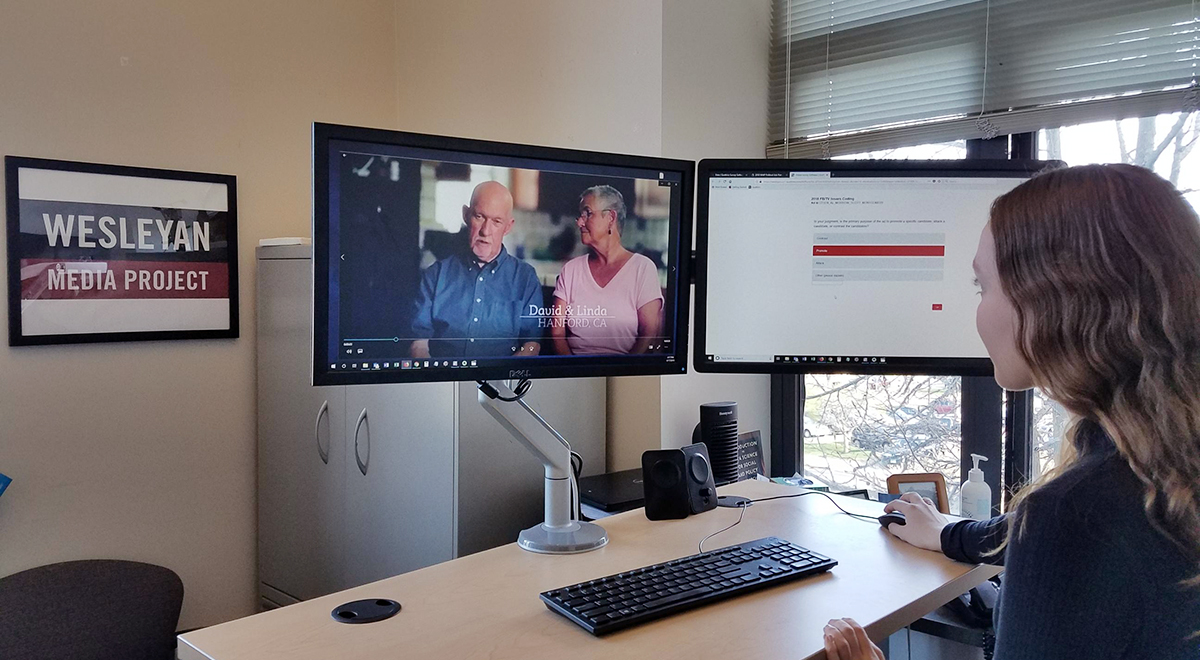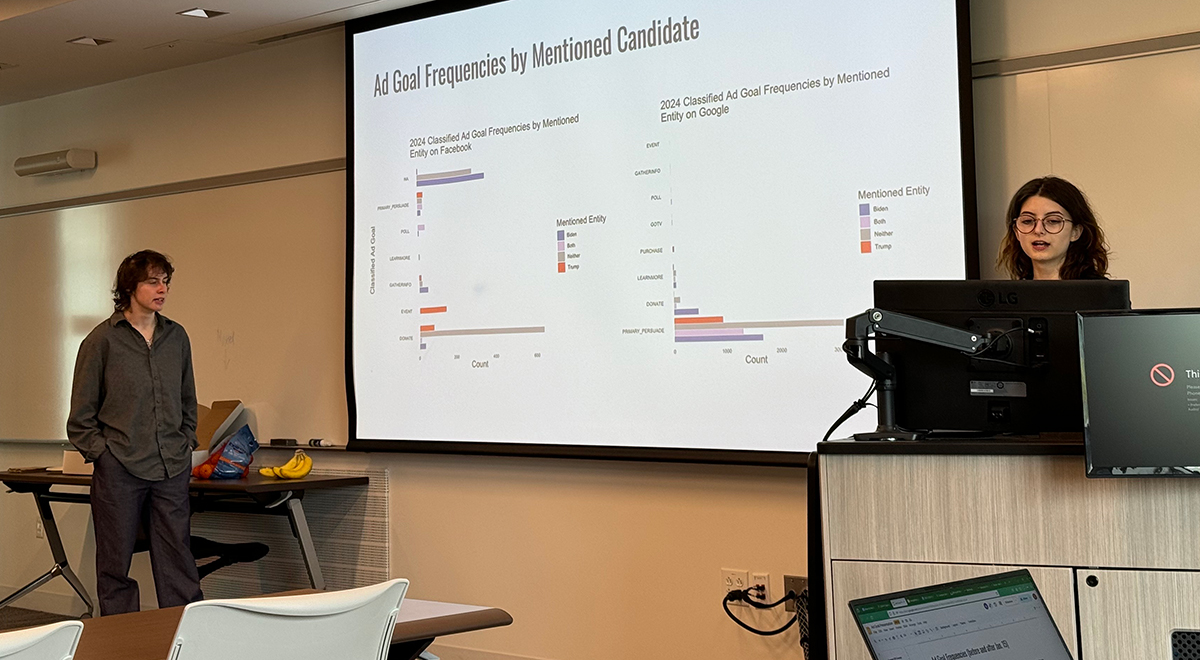Student-Led Lab Shines Light on Political Advertising

Senior Julia Armeli ’25 is one of a dozen undergraduate students using innovative technologies to make sense of the deluge of political ads targeting citizens at Delta Lab, the computational arm of the Wesleyan Media Project (WMP). This election season, Armeli, her student colleagues at Delta Lab — and another group of students at WMP known as human coders — will continue to apply their research and analytical skills to shed light on an increasingly diverse and polarized media messaging landscape.
Delta Lab is a student-centered lab that draws on the skills and passion of students to analyze political ads on such platforms as Google, Facebook, and Snapchat. The sophisticated work of these students, under the direction of WMP Co-Director and Professor of Government Erika Franklin Fowler, in collaboration with the Hazel Quantitative Analysis Center (QAC) Associate Director Pavel Oleinikov, has caught the eye of scholars and reporters who turn to WMP as a go-to source for real-time, nonpartisan election information.
Armeli first learned about Delta Lab as a rising junior while participating in a summer program at the QAC, where she conducted public opinion research on Supreme Court expansion. During her junior year, Armeli joined Delta Lab, collaborating with fellow undergrads and postdoctoral researchers, to explore the potential of technologies like generative artificial intelligence (AI) to classify and analyze political ads.
“That was an exploration we were doing last fall,” said Armeli, who is majoring in Government with a Certificate in Applied Data Science. “In the spring, I was working with a postdoc and another undergrad tracking mentions of relevant people in campaign ads for the upcoming election.”
At that point, the focus of Delta Lab’s work was on analyzing ads for former President Donald Trump and President Joe Biden. But with the shakeup in the presidential campaign this summer, the lab’s focus will expand to include tracking mentions of Vice President Kamala Harris in digital ads. “I’m looking forward to continuing to work on that this fall now that the election cycle has really picked up,” she said.

Launch of a Computational Lab
Delta Lab was launched in 2018 in response to the digital ad libraries made available by Facebook and Google, in addition to the revelation that Trump had spent half of his campaign advertising budget on digital ads in 2016, said Fowler. “That was the watershed moment,” she said. “Television was, and still is, a central way in which campaigns speak to voters, especially older ones. But we knew there was a ton of money being spent online, and researchers had very little insight into the scope and scale of the paid advertising there. Because there is so much more unique content, we needed to grow the tools we use to capture it.”
For six years, Delta Lab has added a computational component to research at WMP to build upon the work of human coders analyzing political ads aired on television. The human coders view individual TV ads and categorize aspects of the ads based on a guidebook to keep observations consistent. But the greater volume of political ads on social media required new computational methods to assess the goals and messages of ads, Fowler said.
To study these digital ads, Delta Lab members – some in collaboration with the Privacy Tech Lab led by Assistant Professor of Computer Science Sebastian Zimmeck – employ a variety of technologies, such as Python (a programming language used to analyze data), AI, facial recognition, and automatic speech recognition, among others. Using these technologies to classify and label ad content, the students examine the goals of ads, issues or candidates mentioned, and ad sentiment as well as effectiveness.
“In a space where we have an increasingly fragmented media ecosystem, how do we describe the universe of the activity that is happening?” said Fowler. “In any given election cycle, there are issues that rise to the top or tactics that come to fruition. We like to be able to understand what topics or issues and what sorts of strategies are more or less effective, and we can’t do that unless we have a more complete picture of what’s happening in messages.”
Scholars and journalists have downloaded WMP’s detailed reports hundreds of times, said Fowler, who is frequently contacted by the media for her expertise. But it is the high quality of the undergraduate students’ contributions that distinguishes the lab’s work and earns it citations in news and academic publications. Delta Lab’s undergraduate members have presented their research at WMP’s post-election conferences, which bring together scholars, journalists and practitioners working on elections. “All of our guests have been impressed with the Wesleyan student research,” she said, describing the students and their work product as phenomenal.
Delta Lab’s student-centered work builds on the innovative efforts of WMP to track election-related advertising and provide analysis to journalists, scholars, and citizens to hold officials and special interests accountable.
“The Wesleyan Media Project provides greater transparency into messaging in campaigns,” said Fowler. The lab “is an amplification of the main goal that we’ve always had, which is to bring more sunlight and understanding of the different messages that are being used to target citizens.”
Student Contributions to WMP’s Research
WMP’s commitment to open and accessible data is a major motivator for Akhil Joondeph ’26, student research assistant lead for the WMP’s human coding team. “Accessible data about politics is rare,” Joondeph said. “The fact that the lab is able to give people all of that, I think, is really special.”
Joondeph, an Anthropology and Dance double-major, is one of dozens of student human coders, who meticulously view, categorize, and log information about political ads for WMP’s reporting. The human coders generate data sets that are then analyzed for transmission to the public. They mostly focus on separate research projects from students in Delta Lab, but their work can overlap.
“Human coders are essential to the work the Wesleyan Media Project is doing,” said Breeze Floyd, WMP’s program manager. “Without our team of undergraduate student employees, we simply would not be able to watch and code each ad, and they offer crucial context that even computational methods cannot yet provide. Our human coders provide the essential validation work for our computational work.”
Joondeph’s work with the WMP has provided them with a view into the political landscape that is substantive and unique. A native of California, they said the research has helped them to see beyond what they now consider an ideological bubble and to tune into the messaging. “So much of this is beyond being on a career trajectory. It’s about how to deal with the world, consume information, and think critically about that information,” Joondeph said.
Mike Mavredakis contributed to the piece.

